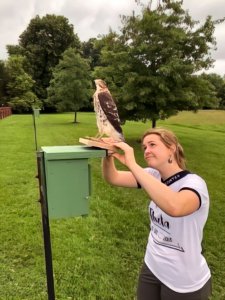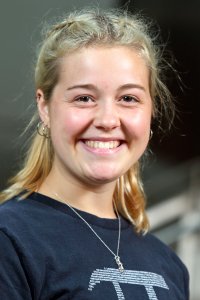Fight or Flight
Ohio Wesleyan Junior Researches the Defensive Behavior of Mother House Wrens


Name: Josie Fornara ’23
Hometown: Coshocton, Ohio
Majors: Pre-professional Zoology & Environmental Science
Minor: Chemistry
OWU Connection Experience: Summer Science Research Program (SSRP)
Fornara spent 10 weeks this summer researching “The Hawk-Snake Game: Responses of Female House Wrens (Troglodytes aedon) to Simulated Nest Predators” under the mentorship of Dustin Reichard, Ph.D., associate professor of zoology.
What I’m Researching
“I spent my summer studying how mother house wrens – a common backyard songbird – respond to two different nest predators. I compared how the wrens defended their nests against a model of an eastern rat snake versus a taxidermied Cooper’s hawk, both of which frequently prey on young wrens. Hawks also pose a significant threat to adult wrens whereas snakes do not.
“The female house wrens frequently dove at and hit the snake model but never demonstrated these defensive behaviors against the hawk model, suggesting that house wrens change their behavior to match the perceived level of risk to themselves and to their nestlings.
“This study has given us more insight into whether or not non-human animals are capable of changing their behavior in order to increase their chances of survival and the survival of their offspring when threatened by different predators.”
Lessons Learned
“This project has allowed me to get hands-on experience studying topics covered during introductory biology courses at OWU like evolution and animal behavior. Studying wren behavior has also piqued my interest in new topics, such as behavioral endocrinology (the study of how hormones influence behavior).
“Exploring these topics through my SSRP project has given me ideas for classes focusing on evolution and behavior that I would like to take during my last two years at Ohio Wesleyan, and I also plan to do an independent study with my mentor during the fall 2021 semester.”
Influencing My Future
“My SSRP project has given me some insight into what it’s like to be a field biologist and whether or not a career in research is a good fit for me. Though my plans for the future are still unclear, I have loved the work that I’ve done this summer, and I plan to continue exploring careers in field research and graduate school programs in ecology, evolution, and behavior.”
My Mentor
“My faculty mentor is Dr. Dustin Reichard. The most important lesson that I’ve learned while working in the Reichard lab is that science is a collaborative field and that the support and skills of each lab member are what make projects successful.
“I have learned so much this summer – not only from my research project, but also from the conversations that I have had with my lab mates during our daily drives to the field sites. Working in the Reichard lab has shown me that you’re never truly alone when you’re working in the sciences – you can always draw on the advice and expertise of your mentors and peers.”
Why I Chose Ohio Wesleyan
“I chose to attend Ohio Wesleyan because I knew that the university’s small size would allow me to form close relationships with faculty members and with my peers, and I hoped that those connections would also help me find hands-on learning, research, and travel opportunities in my field.
“OWU ended up being everything I hoped it would be, and my support system here has encouraged me to join activities and explore programs that I would never have been confident enough to apply for otherwise, including the SSRP program and a study abroad opportunity in Meknes, Morocco.”
My Plans After Graduation
“My plans for after graduation are unclear at the moment. I plan to either enroll in graduate school or pursue a position with the United States Army Corps of Engineers as a biologist doing environmental impact assessments for public works projects.”
